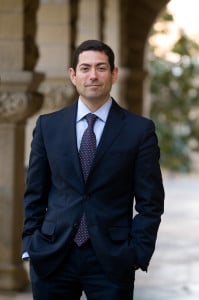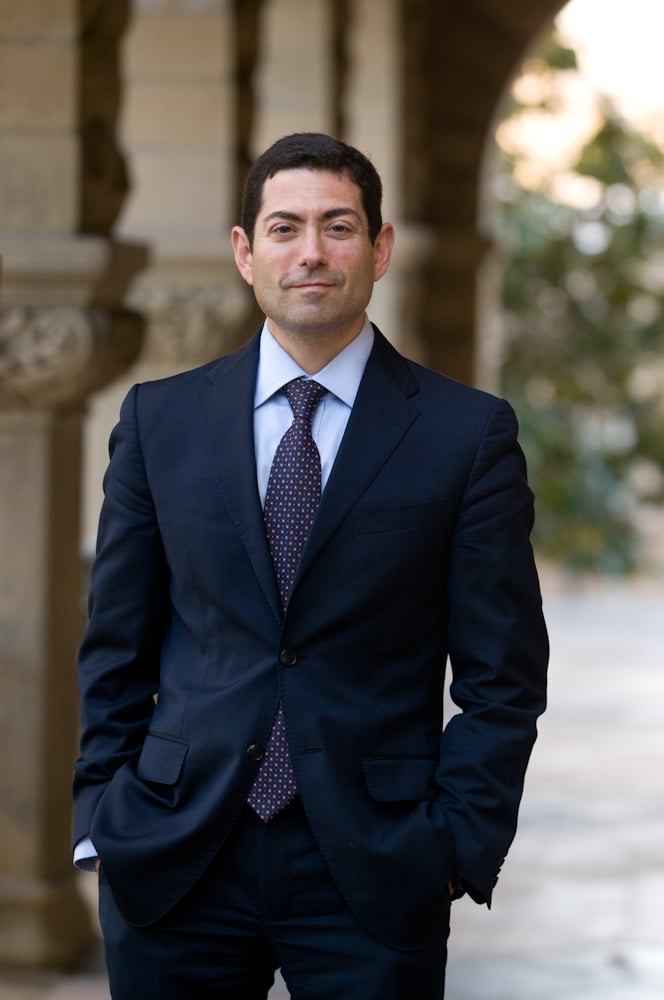“Find something that you can be passionate about and learn it well,” advised Mariano-Florentino Cuéllar M.A. ’96 Ph.D. ’00, the co-director of the Center for International Security and Cooperation (CISAC). Cuéllar’s illustrious career, ranging from Stanford to the White House, could be characterized by exactly that tenet: deep and intense study of the nation’s most pressing policy issues.

At an early age, Cuéllar– who will become the director of the Freeman Spogli Institute for International Studies (FSI) in July– sought to become “the kind of citizen who would be involved in civic affairs.” Cuéllar said that growing up along the U.S.-Mexico border had a profound influence on his understanding of the world and prompted his desire to study politics and governance.
“When you grow up on the border, you realize that a legal demarcation has such a huge effect in distinguishing one country from another, for example, and the whole structure of law shapes who’s a citizen and therefore who counts in one society or another,” he said.
Around the time he entered junior high school, Cuéllar moved to Calexico, Calif., in the Imperial Valley.
“When you come to a place like California, you realize that there is an enormously interesting challenge that is involved in running a society– a state that works well for so many millions of people– that whether you’re talking about the Imperial Valley or Silicon Valley, they share one government,” he said. “They share one institutional structure that has to respond to the needs of people who are from very, very different backgrounds. Probably realizing that made me all the more interested in public institutions and how they work.”
Encouraged by teachers and his parents to pursue higher education, Cuéllar enrolled at Harvard University as an undergraduate, studying government and political psychology. To Cuéllar, “the world seemed limitless,” even as his interest in law intensified.
“I wasn’t certain I wanted to go to law school until I started realizing that lawyers have enormous power to shape what happens in the world with their words, both written and spoken words,” he said. “I remember I spent the better part of an afternoon– maybe even a whole day– down at the federal district court in Boston when I was in college, simply looking around watching trials and legal proceedings occur, and I became very excited about going to law school.”
Cuéllar went on to pursue an unusual set of degrees, earning his J.D. from Yale Law School and master’s and doctoral degrees from Stanford.
“On the record, I want to make sure that everyone knows [Harvard and Yale] pale in comparison to Stanford,” he said with a laugh. “Stanford has had a big place in my life for a long time.”
Before completing his Ph.D., Cuéllar took so me time off to work at the Treasury Department, where he was a senior advisor to the Under Secretary for Enforcement. He described the experience as a formative part of his early career.
“[It was] an incredible opportunity for a young lawyer… to watch policy being made,” he said. “But at the same time, I also felt like you were facing, in government, a series of constraints that never fully allowed you to understand what was happening. It was that that sort of encouraged me to think about a chance to be in academia, so I could study these problems and teach people about them and do research on how institutions work.”
Cuéllar said that he has since sought to combine teaching and academic research with a role in policy making. After leaving the Treasury Department and finishing his Ph.D., he went on to work at the U.S. Court of Appeals for the Ninth Circuit, before finally coming back to Stanford in 2001 as a tenure-track professor at the Law School.
In 2009, however, Cuéllar left Stanford to work on President Barack Obama’s Domestic Policy Council at the White House, where he remained until July of 2010.
Melody Barnes, Obama’s former Director of Domestic Policy, hired Cuéllar after witnessing his work on Obama’s campaign team.
“First of all, he’s brilliant,” she said of Cuéllar. “He’s a brilliant lawyer, but he’s also a brilliant policy analyst, and he’s someone who is able to take in and very quickly analyze new issues– understand their policy implications, understand the nuances and make very strong suggestions.”
According to Barnes, Cuéllar worked on a variety of policy issues, including spearheading a process to reform the food safety system.
“That was a huge, huge deal– something that administrations have been struggling with for many, many years,” she said. “He was able to help the process, run it, and to bring it to an acceptable conclusion and to put proposals in front of Congress.”
Bob Kocher– who worked in the Obama White House on the National Economic Council– collaborated with Cuéllar on several issues, including Food and Drug Administration regulation and transparency, the Department of Agriculture and world economic policy. Cuéllar, Kocher said, was also a key player in immigration reform.
“[Our immigration policy efforts] now are gaining real momentum,” he said, “but it’s the ideas that he developed lovingly in the first term of the administration that I think are going to see light and lead to great changes.”
Cuéllar returned to Stanford in 2010. In 2011 he became co-director of CISAC, one of 11 research centers housed under FSI. He will transition into his new position as director of the entire institute in July of this year.
Barnes said that Cuéllar’s policy experience makes him an extraordinary asset to Stanford.
“He hasn’t just read about it or thought about it. [He] has actually been involved in the policy-making process at the very highest levels of the federal government, so he’s been in the trenches and I think he’ll bring that expertise to the table,” she said. “In addition to that, he’s a brilliant scholar and also someone who is extremely curious and who has been expansive over a broad range of areas of expertise and interest.”
According to Kocher, Cuéllar is a global thinker, a strength that combines well with his influential position at FSI.
“There are few people I know in America who are as broad a thinker, as great a teacher, as inspiring and academically as rigorous and creative as Tino,” he said. “[He’s] going to have a massive impact in America for the next many, many years.”
Cuéllar said that his advice to Stanford students who aspire to follow in his footsteps is simple: never underestimate the power of knowledge.
“Sometimes, people are so excited to pursue a career in public service that they don’t stop to fully reflect on the value of deep knowledge about some area, whether it be education policy or arms control or migration or public health,” he said. “That kind of knowledge is enormously helpful not only to open up job opportunities but also to give you instincts for how to master new areas that you didn’t start with knowledge about, because you’ll know how to ask the subtle questions that will help you round out your knowledge of a new problem.”
Cuéllar said he is greatly excited by the capacity of FSI to help address these problems.
“I think this is an institution reflecting the best of Stanford– its commitment to research, its commitment to training leaders, its commitment to engaging with the world,” he said. “My hope is to empower people to do great things.”
